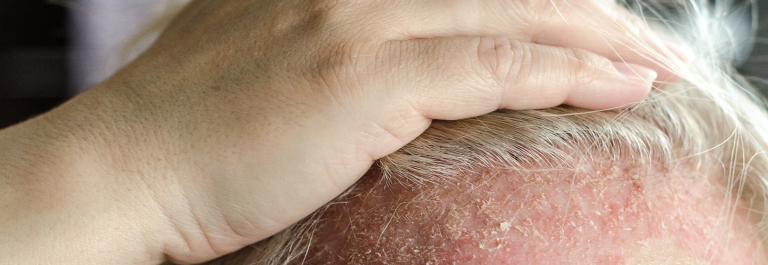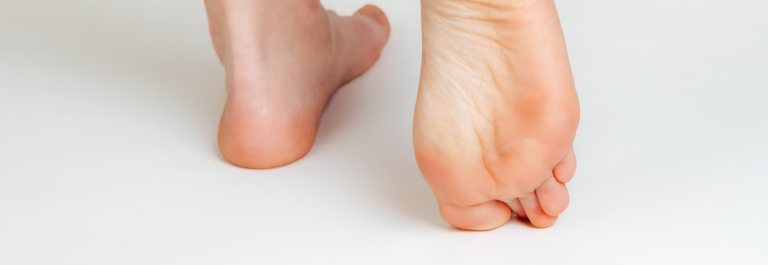Psoriasis is a skin condition that tends to be characterized by red, scaly patches on the skin. Did you know, however, that there is a rare form of psoriasis that causes inflamed pus-filled bumps on the skin? This is called pustular psoriasis, and it can affect all different parts of the body, including the face and mouth.
In this article, we will discuss the following:
-
What is pustular psoriasis?
-
Causes and symptoms of pustular psoriasis on the face
-
Pustular psoriasis treatment plan
Understandably, people with pustular psoriasis on the face may find this condition uncomfortable and even embarrassing: it's hard to hide your face from the world! Luckily, there are many things you can do to help soothe and reduce symptoms of pustular psoriasis on the face. Read on so that you can learn more about this autoimmune disease and put your best face forward!
What is Pustular Psoriasis?
Psoriasis is a skin condition that can affect the entire body. It is generally characterized by dry, flaky skin that is itchy and sometimes painful (plaque psoriasis). Pustular psoriasis is a type of psoriasis in which pus filled bumps appear on top of the scaly skin.
As with all types of psoriasis, pustular psoriasis is a chronic condition. This means there is no cure, and it will affect those with the disease for their entire lifetime. It is not contagious, so it cannot be spread from person to person with physical contact.
According to the National Psoriasis Foundation, psoriasis affects 2 - 3% of the population. Pustular psoriasis is a rare and sometimes severe form of the disease. When the pus filled bumps appear on the face, they can be mistaken for acne, but the symptoms are very different. Pustular psoriasis on the face can be very painful, and you will likely have dry, flaky patches and pus filled bumps on other parts of your body, too.
Pustular Psoriasis Symptoms
How can you tell if you are dealing with pustular psoriasis? There are a few vital signs to look out for. They are:
-
Discolored patches of dry, flaky skin (plaques) combined with:
-
Pus filled bumps (pustules)
-
Intense itching of the skin
-
Painful skin, especially if the pustules burst
People tend to develop pustular psoriasis in cycles: skin plaques and pus filled bumps form over a few days or weeks. Once these pustules burst, new pustules form. Eventually, the psoriasis clears, but it can flare up again when triggered.
What Causes Pustular Psoriasis?
Psoriasis is an autoimmune disease in which a person's immune system is overactive. While the cause is unknown, the body mistakes healthy cells for dangerous ones and begins to attack itself.
In the case of psoriasis, healthy skin cells begin to divide rapidly, causing flaky patches of dead skin cells. In pustular psoriasis, white blood cells (immune cells) tend to collect on the plaques and form pus filled blisters (pustules).
Risk Factors for Developing Pustular Psoriasis
Certain conditions are known to trigger pustular psoriasis. These include:
-
Skin infections or injuries, like cuts, bruises, or scrapes
-
Certain medications
-
Starting or stopping medications
-
Smoking
-
Pregnancy
-
Too much sun exposure
Types of Pustular Psoriasis
-
Localized pustular psoriasis - this type of pustular psoriasis tends to appear in certain body parts, such as hands and feet, and less frequently on the face.
-
Generalized pustular psoriasis - also named Von Zumbusch Psoriasis, this type of pustular psorasis can have more severe symptoms than localized pustular psoriasis. A flare-up can develop quickly, with bumps appearing all over the body within several hours. In some cases, fever, chills, and muscle weakness are present. It is essential to seek medical care if you are experiencing these symptoms. Left untreated, generalized pustular psoriasis might have possible complications and can even be life threatening.
Natural Relief for Pustular Psoriasis on the Face
While pustular psoriasis on your face can be painful and even embarrassing, products are available to help you soothe these symptoms. Dry, scaly skin defines all types of psoriasis, so the most effective topical therapies should focus on moisturizing the skin. Since harsh chemicals and fragrances can often trigger or exacerbate pustular psoriasis, it's best to use skincare products made of simple, natural ingredients.
Cleanse with a Gentle Soap
The first step of any good facial skincare routine starts with a gentle cleanser. The Coconut and Sunflower Oil Bar contains only three ingredients and is safe to use on the delicate skin of the face. Unlike some cleansers, it helps to maintain the skin barrier and doesn't dry out the skin. It is fragrance-free and uses natural ingredients like sunflower oil, coconut oil, and shea butter to nourish the skin. These oils also contain anti-inflammatory properties and soothe the bumps characterized by pustular psoriasis. This soap bar is perfect to use from head to toe and is safe for the whole family.
Moisturize with a Natural Cream
Keeping the dry, irritated skin on your face moisturized is crucial in managing symptoms of pustular psoriasis. A rich, natural moisturizer like the Organic Manuka Skin Soothing Cream will soothe scaly, inflamed skin. Made with only six ingredients, including New Zealand Active Manuka honey, it has anti-inflammatory and anti-bacterial properties. Moisturizing your skin during systemic inflammation will also lessen the chance of scarring from the pustules and skin lesions of generalized pustular psoriasis. With a natural, light honey scent, this oil-based balm is kind to the skin and can be used all over the body.
Protect Your Skin from the Sun
Protecting your skin from the sun is always a good idea, but it becomes crucial when you have pustular psoriasis. Ultraviolet light triggers pustular psoriasis, making it more likely that you will experience a flare-up. Whenever you're outside, be sure to protect the skin on your face by wearing a hat and broad-spectrum sunscreen.
Manage Stress
Being impacted by a chronic condition like pustular psoriasis can be stressful, especially when it affects a part of our body that everyone can see. Not only is this associated with poor mental well-being, but stress can also trigger inflammation in the body, which can worsen symptoms of pustular psoriasis. Reducing stress can be as easy as incorporating light movement like yoga or walking into our day. Mindfulness and meditation are also known to help our stress levels.
When Is It Time To Seek Medical Care?
We can do our best to manage symptoms at home, but there are times when it may be necessary to see a doctor. Seek medical care immediately if:
-
Symptoms become widespread across the body
-
Inflamed skin and pustules become extremely painful
-
Symptoms don't improve despite treatment
-
Pustular psoriasis symptoms affect your mental health
-
You experience fever, chills, or muscle weakness
Some of these symptoms might indicate generalized pustular psoriasis, which can become severe and even life threatening.
Pustular Psoriasis Treatment Plan
The type of pustular psoriasis determines medical treatment. A doctor will consider your symptoms, medical history, and family history to make an accurate diagnosis. Standard methods for treating pustular psoriasis face include the following medications:
Topical Treatments
Topical treatments are psoriasis medications that are applied to the skin. These include corticosteroids, synthetic Vitamin D, coal tar, and salicylic acid. All of these medications reduce inflamed skin by slowing down the reproduction of skin cells.
UV Light Therapy
UV therapy - also known as phototherapy - is another way of treating pustular psoriasis. UVB rays slow down the growth of skin affected by pustular psoriasis, reducing inflammation and pustules. Both topical and light therapy treatment options are localized, targeting only the skin affected by pustular psoriasis.
Oral Treatments
A doctor might prescribe oral psoriasis medications that act as a systemic treatment for pustular psoriasis, which is harder to treat. Taken by mouth, these tend to be more powerful and are usually prescribed when symptoms are more severe, such as in the case of generalised pustular psoriasis. Common examples of an oral treatment plan are oral steroids and oral retinoids.
Find Relief from Pustular Psoriasis
A chronic skin condition like pustular psoriasis can be uncomfortable and frustrating, but knowing how to identify and manage your symptoms allows you to regain control. Follow our tips to find relief today!










